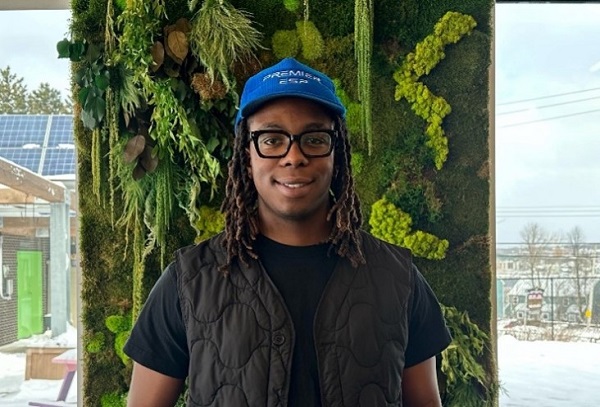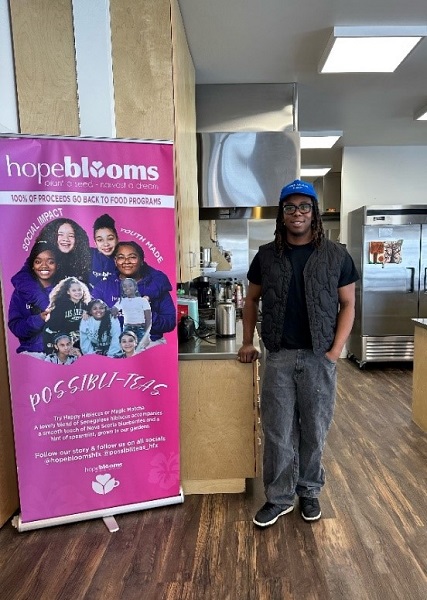Children are little explorers, eager to experience and discover the world around them. Their boundless energy, endless curiosity, and imagination know no limits. They want to see it all—every leaf, cloud, and puddle. As a child, Kolade Boboye was no different, taking big strides and bigger leaps whenever he got the chance. One of those big changes came as an opportunity to help his community, and once he got involved, Kolade never looked back.
From gardens to businesses

Kolade Boboye, Creative Director of Youth Business and Innovation.
2007 was a memorable year for Kolade. At just 7 years old, he and his family left their home in Nigeria to embark on a journey to Canada, settling in Uniacke Square in Halifax, Nova Scotia. Despite the cold, the welcome was warm, with new friends and neighbours encouraging the family to get involved in their community. Hope Blooms was a new project for youth volunteers and had a far-reaching goal to bring fresh produce and positivity to the community. Kolade decided to join; though spending his spare time sifting through soil and wrestling with weeds didn’t seem very fun at first, it was something he was willing to try.
And that decision changed everything.
Along with 5 other youth volunteers, Kolade had an incredibly successful first growing season. With mounds of tomatoes, peppers, corn, and onions, they made what was only reasonable with their harvest: salsa.
“It was a fun project making our own salsa,” Kolade recalls. “We made a hundred bottles and sold them all at a local market. Afterwards, the founder of Hope Blooms asked us what we wanted to do with the profits, and we all agreed we wanted to put it back into the community.”
With salsa on the table, Kolade and the crew set their sights on a new condiment—a fresh herb salad dressing. Almost overnight, their profits soared. Selling a few cases every week at a local farmer’s market turned into a thriving business, even winning over Dragon’s Den in 2013. With the funding from the Dragons, Hope Blooms was able to purchase a greenhouse, growing nearly 5 tonnes of food every year. All the produce was donated to those in need in their community and allowed for year-round production of their salad dressing. It became so popular that Kolade and his fellow volunteers began selling the dressing in grocery stores across Nova Scotia and parts of New Brunswick.
For the next 15 years, the team continued to grow and feed their community. Kolade eventually made his passion his career, becoming Hope Blooms’ creative director and sharing his knowledge with the next generation of youth volunteers. But when the pandemic hit, Kolade and the Hope Blooms staff were faced with a challenge that none of them saw coming.
A recipe for expansion
As the world locked down for almost 2 years, the needs of the community started to shift. The demand for access to hot, nutritious meals through food banks and other support networks grew. The Hope Blooms’ team wanted to raise more funds to support demand by increasing their salad dressing production, but lacked the space to do so.
At the same time, community members felt more isolated than ever before, no longer able to gather in person as they once had. Families in the community knew they could turn to Hop Blooms for produce, but they also needed a space where they could reconnect as a community. Kolade and the rest of the Hope Blooms team knew the organization had to shift, so as pandemic restrictions eased, it was time to take the next step to tackle food insecurity in a new way.
“We grew really fast over the years and during the pandemic; we became an essential service. More and more families started relying on us for food,” recalls Kolade “We felt like a snail that outgrew its shell. We knew that we needed to expand.”
A community kitchen was the perfect solution to all their needs, but it couldn’t be a regular kitchen. There had to be multiple appliances and countertops, enough fridge space to house the produce from their gardens, and a place for shelf-stable pantry staples. Learning was also a priority: make 1 meal, someone’s fed for a day; teach people to cook, and they’re fed for life.
An operation like that needed an incredible amount of financial support, so the team turned to Agriculture and Agri-Food Canada’s Local Food Infrastructure Fund (LFIF) to help them build this community space.
The Local Food Infrastructure Fund
The Local Food Infrastructure Fund (LFIF) was a 5-year, $70 million initiative that ended on March 31, 2024. It was created as part of the Government of Canada's Food Policy for a healthier and more sustainable food system in Canada. Since it launched in August 2019, LFIF has committed $65 million to support over 1,110 projects to improve food security across Canada.
A culinary community haven
It didn’t take long for their new kitchen to come together. Based entirely on input from the community, Hope Blooms refitted their entire floorplan to accommodate 8 new cooking stations, refrigerators, and countertops. The doors of their new Global Kitchen for Social Change opened in 2021.
Beyond creating a space for the community to come together, the kitchen has grown to offer new possiblities for young people. Hope Blooms offers an after school program where youth can learn hands-on culinary skills and weekly community events where the youth prepare supper for more than 150 people.
They’ve even created a new initiative, Food Without Borders, where members of the community can come together to cook meals from their home countries while sharing stories associated with the dishes. Hope Blooms was also able to move the manufacturing for their salad dressing into the new space, allowing for an increase in production from volunteers and staff alike.

Kolade in Hope Blooms’ Global Kitchen for Social Change.
“Food is a very universal language and is understood by everyone,” says Kolade. “This is a safe space for people to come together, cook meals and talk. Regardless of how different we are, there are lots of similarities, and this kitchen represents that. Funding like LFIF has made it possible for us to have a space where the community can bond and share their love for food.”
When the opportunity came up for Hope Blooms to apply for more funding through LFIF in 2023, they jumped on it. With the recent phase of funding, Hope Blooms has purchased additional equipment, including water infrastructure, a freezer, cooking appliances, and preservation equipment. Since 2020, Hope Blooms has received a total of nearly $50,000 through LFIF.
Kolade smiled as he looked around at the brand new kitchen nestled in the heart of his community. He knew that his years of hard work and dedication have made a positive long-term impact that will be carried on throughout generations. Hope Blooms is truly a place where hope has blossomed into something beautiful.
Get more Agri-info
- Want more stories like this? Explore what else Agri-info has to offer.
- Interested in reporting on this story? Contact AAFC Media Services at aafc.mediarelations-relationsmedias.aac@agr.gc.ca to arrange an interview with one of our experts.